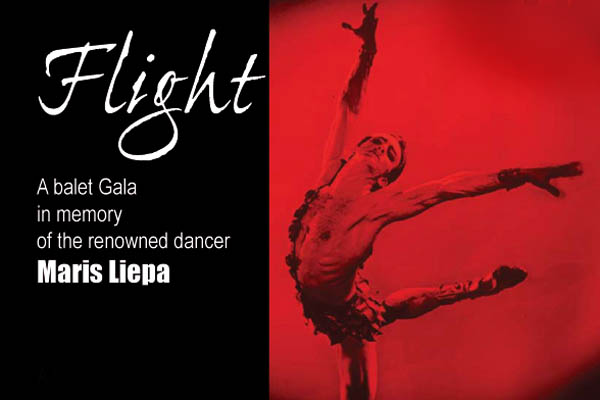
Ballet galas might be the dream of every spectacle-craving balletomane, but they can easily become a nightmarishly boring series of ‘party pieces’ if they are not properly organised. Luckily, this is not the case when a company such as Ensemble Production takes over, as demonstrated by a number of recent and successful events. Not unlike the galas for Maya Plisetskaya’s and Yuri Grigorovich’s 80th birthdays, its latest creation, Flight, organised jointly with the Maris Liepa foundation, brought together a plethora of stars to celebrate a dance artist from the past.
The name of Maris Liepa might not be as familiar to youngish Western ballet-goers as those of Nureyev and Plisetskaya; but he was one of the greatest figures of 20th-century Russian ballet, as demonstrated by the filmed snippets that started the evening last Sunday at the Coliseum. Liepa was indeed one of those charismatic dance–actors whom middle-aged ballet-goers like myself desperately long for today. Fortunately, the live dancing that followed the projections did not create too harsh a contrast, as the various artists stood out for electrifying magnetism and damn good technique. Flight also stood out for the well-structured programme, which alternated classic numbers — including the inevitable but always welcome Le Corsaire pas de deux and the even more inevitable and equally welcome Don Quixote pas de deux — with more daring choices, such as William Forsythe’s In The Middle Somewhat Elevated. In the sparkling Don Q, the Bolshoi’s rising star Natalia Osipova, partnered by a scintillatingly elegant Leonid Sarafanov, repeated the captivating stunts seen last summer on the same stage. In Corsaire, the Royal Ballet’s sensation Marianela Nuñez showed how technical bravura is not necessarily synonymous with shallow circus tricks, performing breathtaking pyrotechnics with unique aplomb and elegance, while partnered by an equally dashing and impeccable Tiago Soares.
Balletomanes’ favourite, Svetlana Zakharova, moved swiftly from a technically perfect, though slightly too cold for my taste, interpretation of the ‘Dying Swan’ to an energetic new piece called Revelation by Hiroyama, in which she displayed a powerful modern drive. Paris Opéra superstars Agnès Letestu and José Martinez shone in the Forsythe duet, while the Bolshoi’s Maria Alexandrovna and Sergei Filin engaged in a duet from the restored 19th-century Egyptian romp La Fille du Pharaon. The Royal Ballet presence was certainly significant throughout the evening: Tamara Rojo and Federico Bonelli opened with a catchy, though oddly adapted, pas de deux from Esmeralda, while Sarah Lamb and David Makhateli, from the same company, launched themselves in a rendition of Mikhail Lavrovsky’s ‘Balcony’ pas de deux from Romeo and Juliet. They were joined by Alina Cojocaru and Johan Kobborg in the act one duet from Onegin and by Sergei Polunin in the ‘Bronze Idol’ solo from La Bayadère. More extracts from 20th-century ballets completed the rich programme. Ilze Liepa and Dmitry Gudanov performed a duet from Roland Petit’s Pique Dame and she also appeared with Mark Peretokin in a duet from the little-known Madame Bovary by Michael Shannon, while Vladimir Derevianko appeared in his signature solo The Firebird, choreographed by Uwe Scholz. Not all of them were choreographically stunning or exciting, but they certainly managed to create a lively game of shadings and contributed, together with a number of small accidents, to the general thrill of a nicely memorable evening.
Spectator
Giannandrea Poesio

